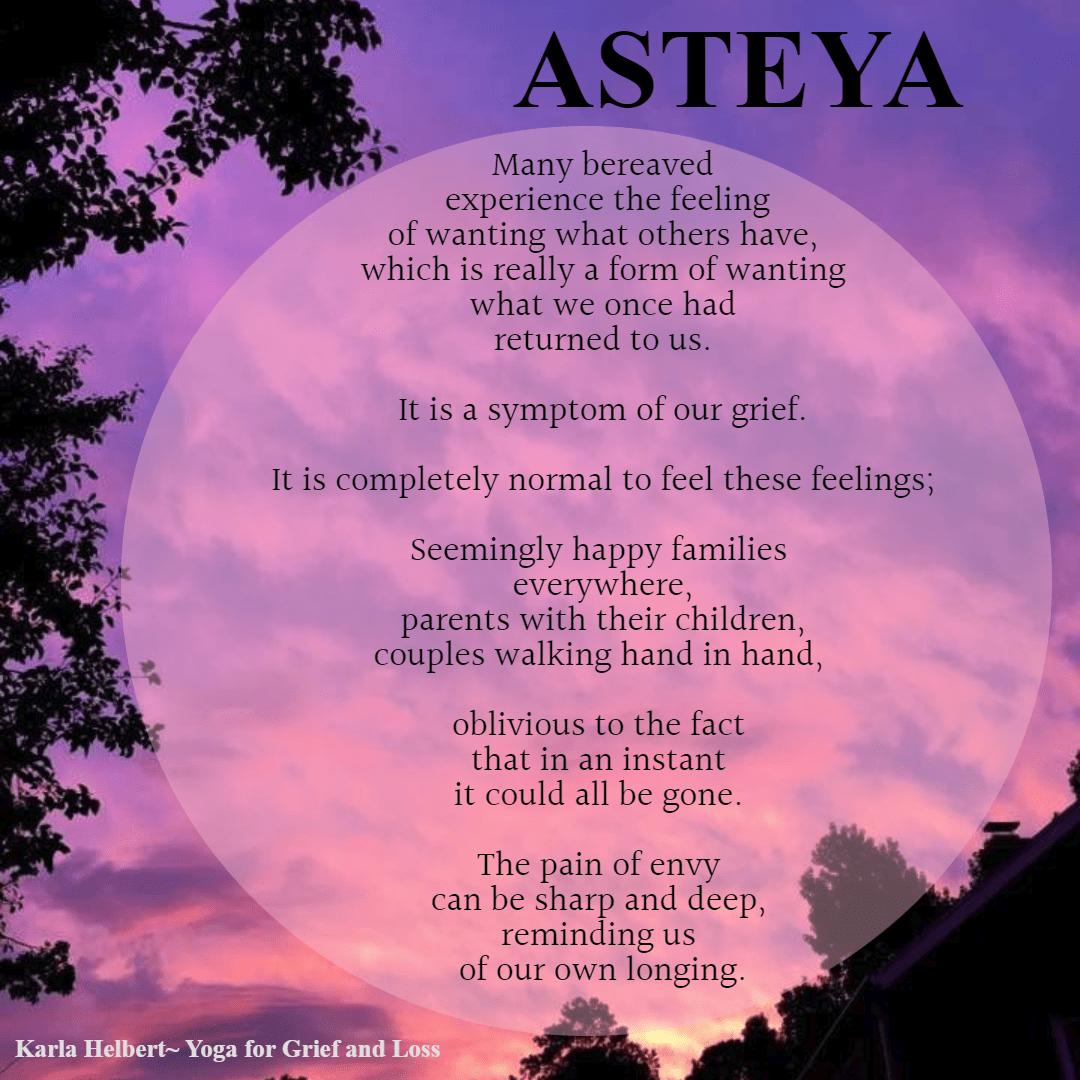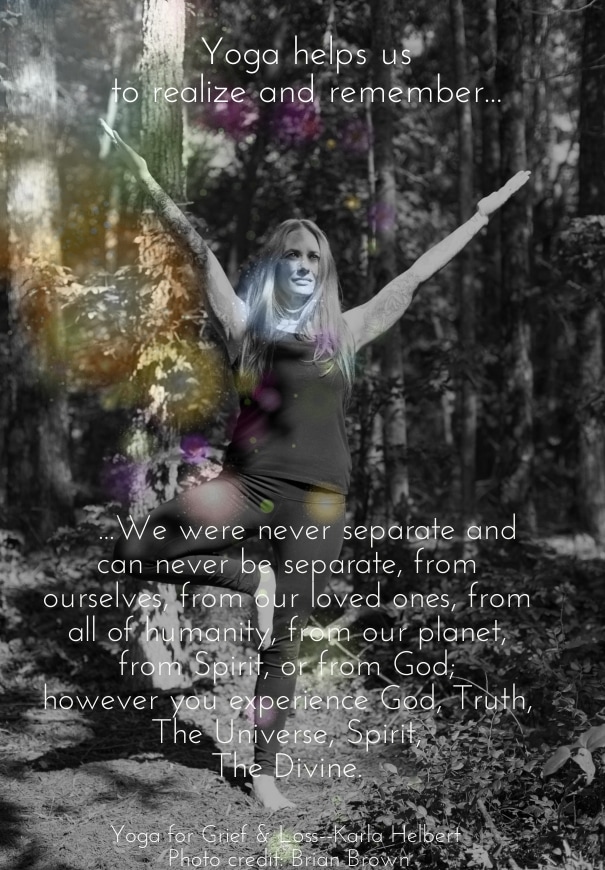- Meet Karla
- Free Guided Meditations
- Events & Workshops
- Get Your Free E-Book Breathing Lessons
- Work With Me
- Ketamine Assisted Psychotherapy (KAP)
- Reiki
- Tarot
- Chakras
- Yoga Nidra
- Mudra Practices to Support the Heart
- Frequently Asked Questions
- Just Breathe
- Altars and Shrines
- Tips & Articles
- Gift Certificates
- Press and News
- Blog: The Therapeutic Life
- The Mind in Grief
- Grounding
Fortunate is she who does not carry envy as a companion. ~RumiThis is the third installment in the series on the Yamas and Niyamas. The Yamas are five conditions of behavior that millennia ago, the ancient Sage Patanjali, in his Yoga Sutras, counseled we should refrain from doing. According to Patanjali, if we can follow these guidelines, we may live a more harmonious and ethical life. This third yama, asteya, is about non-stealing. At first look, this seems to have not much to do with grief, but the Sanskrit language is complex and multi-layered. There is more here than you might think which can apply to you. And to us all. The root of stealing is envy. Wanting something which others have. And which we ourselves do not. In this Springtime season of weddings, proms, graduations, family gatherings, baby showers, Easter, Passover, Mother's and Father's days, and welcomings of all sorts, it seems renewal is everywhere and rituals of happy life transition, celebrations of new and continuing growth abound. With these, for those in grief, the opportunity for envy to be our companion is also everywhere. Of course you want what you once had and no longer have. Or what you almost had, or what you could have had and lost. Irrevocably. Those of us in grief, who have loved and lost and pined and yearned and walked around with these feelings as now part of our very DNA, in our blood and bones, filled with the longing for that which can never again be full or fulfilled, or may never have been in the first place...how we can escape the wanting? Or the occasional envy?...I don't know. I do know that we can recognize it when it comes. We can try simply allowing it to be and we can try, if we can, to soften the berating that perhaps we hand ourselves when we find our hearts leaning toward envy. Can we cultivate compassion in these spaces? Can we see ourselves, speak to, and treat ourselves, as someone who loves us dearly might? In our pain, our longing, here, bereaved and bereft? Can we forgive ourselves of envy? Asteya means “non-stealing.” Thou shalt not steal, is the simplest way of interpreting this Yama. Most of us are not outright thieves. It is doubtful that grief drives most to steal things that don’t belong to them, or to become a compulsive shoplifters. Though, that is certainly not out of the realm of possibility. As with so much of yoga—and of life and grief—this yama can be complex. Many teachers speak of asteya as “absence of envy,” “absence of jealousy,” or sometimes, “non-misappropriation”—believing that those more accurately capture the spirit of the word. The literal interpretation of non-stealing certainly can apply where appropriate. Feelings of envy, covetousness and entitlement can result in theft certainly. We want what others have. This is a human emotion, the human condition. Observing our thoughts and experiences mindfully, questioning our own thinking, asking ourselves if what we tell ourselves about others’ fulfillment is true, witnessing our own mind with compassion and without judgment, we can continue to cultivate awareness and eventually movement toward wholeness. We can also learn to close the gap between us and others, find support and share our truths with those we can trust. Ultimately, we can return to a place where we can recognize and remember that there is no separation. Acts of comparing and envying are human constructs that serve to deepen isolation. Practicing compassion, seeking connection, and always cultivating awareness can help us move more easily through painful feelings. The foundation of envy is comparison. We divide the world into categories and classifications and compare ourselves to those on a daily basis. The more we compare, the more separate and isolated we become. Feeling isolated and separate from others increases longing for fulfillment. In grief, already feeling isolated and separate, that longing is naturally focused on our beloved dead. We envy others who are not swimming in grief, who we perceive as not tortured by such longing, we believe surely they must be more fulfilled than we. This is an understandable state of mind that in the long run does not serve us and through which we risk further separation and which can lead to harmful, violent thoughts and behavior toward ourselves and others. It isn’t that having these feelings is wrong in any way. They are very natural. What matters is what we do with the feelings when we notice them. Can we acknowledge them, in whatever form they come, with gentleness? Or do we swallow them, hide them even from ourselves, denying the pain and the risks inherent in such feelings. Do we feed them, and feel safer in anger, resentment and isolation than in acknowledgment of vulnerability and pain? Acknowledging envy and desire as natural results of deep grief, breathing into those spaces of hurt, allowing them to be what they are, can help them to dissipate. Let the feelings move, find a way to express them, make space for something new. To do that, we must first allow the feelings. Envy is no stranger to any grieving parent who watches their dead children’s friends grow, go to prom, graduate, marry, have children of their own. Weddings, graduations, births, birthday parties, family gatherings, dinners out, walking around the neighborhood, watching television—all places and occasions for tendrils of envy to unfurl from the hearts of all manner of grieving people. Mothers, fathers, widows, widowers, siblings, grandparents, friends all have experienced the feelings of envy in grief; wanting what we don’t have and will never have again, desperately longing, and feeling that pain over and over. Allowing envy to flourish, can result in feelings of resentment, anger and injustice; even in a sense of victimhood—all of which can lead to harm to ourselves and others. Many bereaved experience the feeling of wanting what others have, which is really a form of wanting what we once had returned to us. It is a symptom of our grief. It is completely normal to feel these feelings: seemingly happy families everywhere, parents with their children, couples walking hand in hand, oblivious to the fact that in an instant it could all be gone. The pain of envy can be sharp and deep, reminding us of our own longing. Such feelings can easily turn to anger, hatred, and blame—toward ourselves as well as others. Excerpt from Karla's book Yoga for Grief and Loss Practice: Tree Pose~ VrksasanaTree pose helps us to feel grounded and supports the root chakra, Muladhara. In tree pose, you may wish to imagine roots growing from your feet into the ground, pushing into the floor, through the foundation of the building, into to soil of the Earth, past all the layers of rock, deeper and deeper into the Earth’s crust until it reaches the red molten core of the planet. Imagine with each inhalation drawing this red light upward into your roots into the root chakra bringing strength, stability, warmth and security. As you exhale, allow fear, tension and stress to leave the body.
To come into tree pose, come first to tadasana. Find your balance and stillness first here. You may leave the arms down, have them on the hips, or together at the heart center in anjali mudra. Bring your awareness to the right leg and transfer the weight onto that foot, feeling the shift. Balance evenly, spreading the foot, distributing the weight evenly. Bend the left knee, externally rotating the hip so the knee points outward. Lift the left leg off the floor, placing the foot on the inside of the standing right leg. Place the sole of the foot on the ankle, the calf or the inner thigh of the right leg. Do not place the foot on the knee joint. To place the foot on the inner thigh, use the hands to position the foot properly. This can be a further challenge to maintaining balance. Once the leg is in place, bring the hands to anjali mudra. Keep the hands here or extend the arms upward like branches of a tree. Have the palms open in a receptive gesture. This posture is also a lovely pose in which to experience gratitude. Repeat the tree posture on the other side.
0 Comments
Leave a Reply. |
AuthorKarla Helbert, LPC Archives
January 2019
Categories
All
|
© Karla Helbert, MS, LPC All Rights Reserved
- Meet Karla
- Free Guided Meditations
- Events & Workshops
- Get Your Free E-Book Breathing Lessons
- Work With Me
- Ketamine Assisted Psychotherapy (KAP)
- Reiki
- Tarot
- Chakras
- Yoga Nidra
- Mudra Practices to Support the Heart
- Frequently Asked Questions
- Just Breathe
- Altars and Shrines
- Tips & Articles
- Gift Certificates
- Press and News
- Blog: The Therapeutic Life
- The Mind in Grief
- Grounding



 RSS Feed
RSS Feed